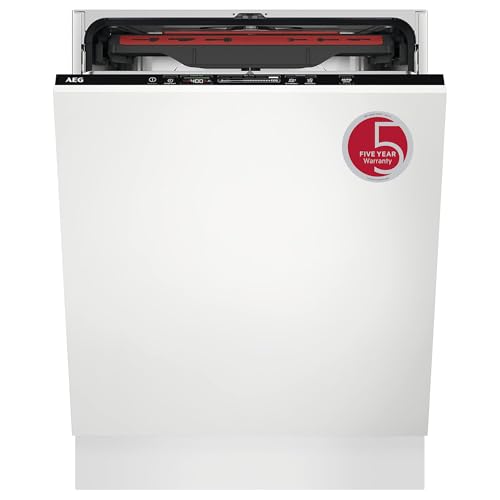




When it comes to buying a new washing machine, one of the most important factors to consider is the capacity. The size of the drum will determine how many clothes you can fit in a single load, which can ultimately save you time and energy. But with so many different options available, it can be overwhelming to choose the right size for your laundry needs. That’s why we’ve put together this ultimate washing machine capacity guide to help you find the perfect size for your laundry needs.
First, let’s talk about the different capacity options available. Washing machine capacities are measured in kilograms, and they can range from as small as 5kg to as large as 12kg or more. Smaller capacities are perfect for individuals or small families, while larger capacities are ideal for those with big families or a lot of laundry to do.
Next, you’ll want to consider your laundry habits. Do you prefer to do small loads more frequently, or do you wait until you have a large pile of clothes to wash? If you like doing smaller and more frequent loads, a washing machine with a smaller capacity will be suitable for you. However, if you prefer to do larger loads less often, then a machine with a larger capacity will be more convenient.
Remember that overloading your washing machine can affect its performance and potentially damage your clothes. It’s always better to err on the side of caution and choose a size that allows for proper washing and spinning of your clothes.
Lastly, it’s important to consider the space you have available in your laundry area. Measure the dimensions of the area where you plan to place the washing machine to ensure it will fit properly. Keep in mind that larger capacities usually mean larger machines, so make sure you have enough space for a bigger model if that’s what you need.
By considering these factors and using our washing machine capacity guide, you can confidently choose the perfect size for your laundry needs. Whether you’re a single individual or part of a large family, there’s a washing machine out there that’s just right for you. Happy washing!
Choosing the Right Washing Machine Capacity
When it comes to choosing the right washing machine capacity, there are a few factors to consider. The capacity of a washing machine refers to the amount of laundry it can hold in one cycle. Selecting the right capacity for your needs is important in order to maximize efficiency and ensure your laundry is properly cleaned. Here are some tips to help you choose the right washing machine capacity:
Determine Your Laundry Load Size
The first step in choosing the right washing machine capacity is to determine your typical laundry load size. Consider the number of people in your household and how often you do laundry. If you have a large family or do laundry frequently, you’ll likely need a larger capacity washing machine to accommodate your needs. On the other hand, if you live alone or have a small household, a smaller capacity machine may be sufficient.
Consider the Types of Clothes You Wash
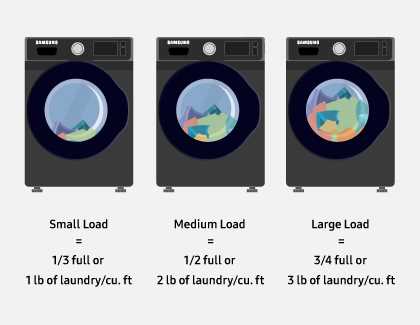
Another factor to consider is the types of clothes you typically wash. If you often wash bulky items such as bedding or large towels, you’ll need a washing machine with a larger capacity to properly clean these items. On the other hand, if you mainly wash smaller items like shirts and underwear, a smaller capacity machine may be suitable.
Think About Future Needs
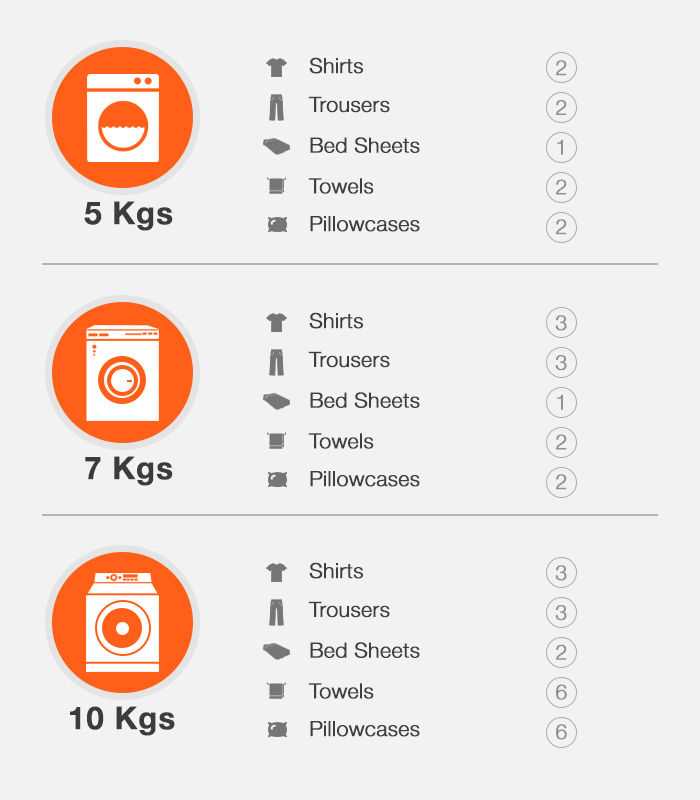
When choosing a washing machine capacity, it’s also important to think about your future needs. If you plan on expanding your family or anticipate an increase in laundry demands, it may be wise to choose a larger capacity machine to accommodate these future needs. Investing in a slightly larger machine now can save you the hassle and expense of upgrading in the future.
Check Manufacturer Recommendations
Lastly, it’s important to check the manufacturer’s recommendations for the washing machine you are considering. Each machine will have a recommended capacity range, and it’s important to choose a machine that falls within this range. Choosing a capacity that is too small may result in inefficient cleaning, while choosing a capacity that is too large may result in wasted energy and water.
In conclusion, choosing the right washing machine capacity is essential for ensuring efficient and effective laundry cleaning. By considering factors such as your laundry load size, types of clothes you wash, future needs, and manufacturer recommendations, you can select a washing machine with the perfect capacity for your needs. Remember to consider these factors and make an informed decision before making your purchase.
Understanding Laundry Needs
When it comes to choosing the right washing machine capacity, it’s important to understand your specific laundry needs. The size of your household, the frequency of washing, and the types of clothes you typically wash will all determine the capacity that is best suited for you.
Household Size
Consider the number of people in your household when deciding on the washing machine capacity. A smaller household with 1-2 people may find a compact washing machine with a smaller capacity sufficient. However, a larger household with 3 or more people might require a larger capacity to accommodate the increased laundry load.
Frequency of Washing
How often you do laundry will also influence the capacity you need. If you wash laundry frequently, a larger capacity washing machine can help you tackle more loads in less time. On the other hand, if you do laundry infrequently, a smaller capacity may be suitable.
Types of Clothes
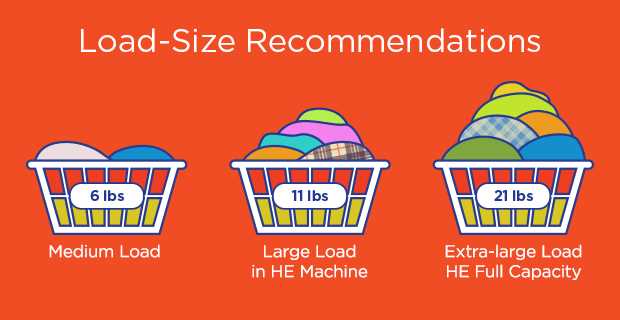
Consider the types of clothes you typically wash. If you often wash bulky items like blankets, comforters, or heavy coats, you may need a larger capacity washing machine to ensure they fit comfortably. Similarly, if you frequently wash delicates or small items like socks, a smaller capacity machine may be more suitable to prevent them from getting lost or damaged.
Other Considerations
- Space availability: Take into account the available space in your laundry area when choosing the capacity of your washing machine.
- Budget: Larger capacity washing machines often come with a higher price tag, so consider your budget when making a decision.
- Energy efficiency: A larger capacity washing machine may consume more energy, so consider the energy efficiency ratings of different models.
By understanding your specific laundry needs and considering these factors, you can choose the perfect washing machine capacity that meets your requirements and ensures clean and fresh laundry every time.
Types of Washing Machine Capacities
When it comes to choosing a washing machine, one of the most important factors to consider is its capacity. Washing machine capacities are typically measured in cubic feet or kilograms, and they determine how much laundry you can fit in the machine at a time.
There are several types of washing machine capacities to choose from, each suited to different laundry needs. Here are some of the most common types:
Small Capacity
A small capacity washing machine is generally considered to have a capacity of around 4-6 cubic feet or 2-3 kilograms. These machines are ideal for individuals or couples who don’t have a lot of laundry to do on a regular basis. They are also a good option for small apartments where space is limited.
Medium Capacity
Medium capacity washing machines typically have a capacity of around 7-8 cubic feet or 3-4 kilograms. These machines are suitable for small families or individuals who do laundry more frequently. They can handle larger loads and are often equipped with additional features and wash cycles.
Large Capacity
Large capacity washing machines have a capacity of around 9-12 cubic feet or 4-6 kilograms. These machines are designed for large families or individuals with heavy laundry needs. They can handle large and bulky items like comforters and blankets, and they often have special cycles for delicates or heavily soiled items.
Extra-Large Capacity
Extra-large capacity washing machines have a capacity of 12 cubic feet or more. These machines are suitable for commercial or industrial use, such as laundromats or hotels. They can handle very large loads and are often equipped with advanced features like multiple wash programs and automatic detergent dispensers.
Compact Capacity
Compact capacity washing machines are smaller than traditional machines and are designed for apartments or small spaces. They typically have a capacity of around 2-3 cubic feet or 1-2 kilograms. Despite their small size, they can still handle most types of laundry, but may require more frequent loads.
When choosing a washing machine capacity, it’s important to consider your specific laundry needs and the available space in your home. A machine with too small a capacity may not be able to handle your laundry load, while one with too large a capacity may be wasteful in terms of energy and water usage. Take the time to assess your needs and choose a washing machine capacity that is suitable for you.
Factors to Consider
1. Laundry Volume
The first factor to consider when determining the capacity of your washing machine is your laundry volume. Think about how often you do your laundry and how many loads you typically have. If you have a large family or generate a lot of laundry, you will need a washing machine with a larger capacity. On the other hand, if you live alone or have a small family, a washing machine with a smaller capacity may be sufficient.
2. Space Constraints
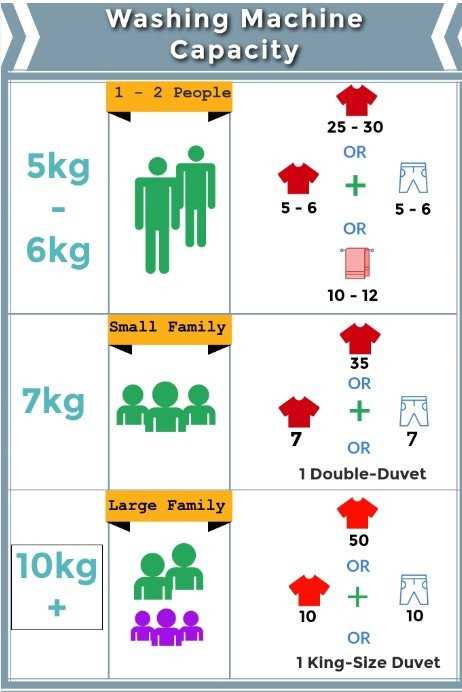
Another important factor to consider is the amount of space you have available for your washing machine. Measure the area where you plan to install the machine to ensure that it will fit properly. Take into account any doorways, cabinets, or other obstacles that may restrict the available space. It’s also important to consider the height and depth restrictions, especially if you plan to stack your washer and dryer.
3. Types of Clothing
The types of clothing you typically wash can also influence the capacity of your washing machine. If you often wash bulky items such as bedding or winter coats, you will need a larger capacity to accommodate these items. On the other hand, if you mostly wash small and lightweight garments, you may be able to manage with a smaller capacity.
4. Long-Term Needs
It’s important to consider your long-term needs when selecting the capacity of your washing machine. If you anticipate changes in your household, such as the addition of children or a growing family, it may be wise to choose a washing machine with a larger capacity. This will ensure that your machine can meet your needs as your family size changes.
5. Energy Efficiency
Energy efficiency is another factor to consider when selecting the capacity of your washing machine. Larger capacity machines may use more water and energy to operate, which can increase your utility bills. On the other hand, smaller capacity machines may require more frequent loads, resulting in increased energy consumption. Consider your energy usage and choose a capacity that strikes a balance between your laundry needs and energy efficiency.
6. Budget
Lastly, your budget is an important consideration when determining the capacity of your washing machine. Larger capacity machines tend to be more expensive than smaller ones. Consider your budget and find a washing machine that meets your laundry needs without stretching your finances too thin.
Finding the Perfect Size
When it comes to choosing the right washing machine for your laundry needs, one of the most important factors to consider is the size. Finding the perfect size can ensure that you have enough space for all your laundry while also being energy-efficient.
Assess Your Laundry Needs
Before you start looking at washing machines, it’s important to assess your laundry needs. Consider factors such as the size of your household, the frequency of your laundry loads, and any specific requirements you may have. This will help you determine the right washing machine size for you.
Capacity Options
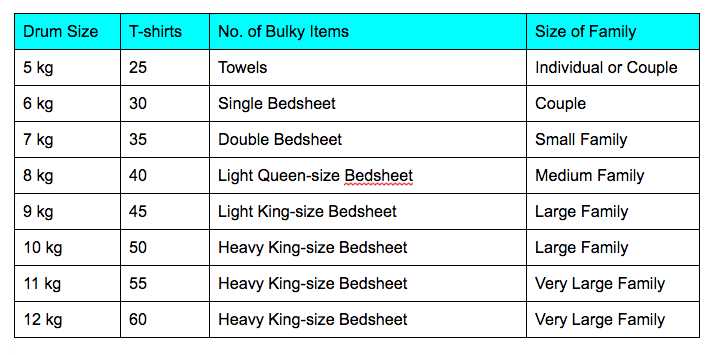
Washing machines come in a variety of capacity options, ranging from compact models to larger ones. Here are some common capacity options:
- Small capacity: Suitable for small households or apartments with minimal laundry needs. These machines typically have a capacity of up to 6kg.
- Medium capacity: Ideal for average-sized households with moderate laundry needs. These machines usually have a capacity of 6-8kg.
- Large capacity: Perfect for large families with heavy laundry loads or individuals with specific requirements, such as washing bulky items. These machines typically have a capacity of 8kg or more.
Consider Your Space
Another factor to consider when choosing the perfect washing machine size is the available space in your laundry room or designated area. Measure the dimensions of the space and compare them with the dimensions of the washing machine you are considering. Ensure that there is enough room for installation, loading, and any additional features you may need, such as a dryer.
Energy Efficiency
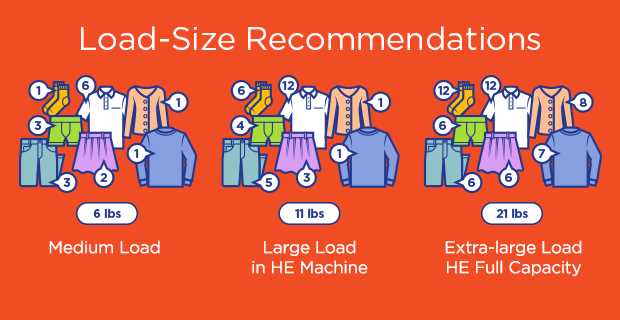
Choosing the right washing machine size can also contribute to energy efficiency. Larger machines may consume more energy, especially if they are not fully loaded, while smaller machines may require more frequent cycles. Look for energy-efficient models that have high energy star ratings, indicating that they consume less water and electricity.
Consult the Manufacturer’s Recommendations
Lastly, it’s always a good idea to consult the manufacturer’s recommendations or speak to a professional to ensure that you are choosing the right washing machine size for your specific needs. They can provide valuable insights and help you make an informed decision.
By considering your laundry needs, assessing your space, and being mindful of energy efficiency, you can find the perfect size washing machine that will meet all your requirements and make doing laundry a breeze.
Tips for Maximizing Efficiency
- Sort your laundry by fabric type and color before washing to ensure that you can use the appropriate settings for each load.
- Use the right amount of detergent for each load to prevent waste and maximize cleaning power. Follow the instructions on the detergent packaging for guidance.
- Consider using cold water instead of hot water for most loads. This can help save energy and prevent colors from fading or bleeding.
- Pre-treat stains before washing to increase the chances of removing them successfully. This can help avoid the need for re-washing or using harsher chemicals.
- Opt for shorter wash cycles whenever possible to reduce water and energy consumption. Many modern washing machines offer quick wash or eco-friendly options.
- Avoid overloading the washing machine as this can reduce its ability to clean effectively. Follow the manufacturer’s guidelines for the maximum recommended load size.
- If you have small or light loads, use the machine’s half-load or economy setting to save water and energy.
- Empty the lint filter regularly to improve drying efficiency and prevent the build-up of lint in the machine.
- Consider using a clothesline or drying rack instead of a dryer whenever weather permits. Air-drying your clothes is an energy-efficient alternative.
- Regularly clean the washing machine to prevent build-up of dirt, soap residue, and bacteria. Refer to the manufacturer’s instructions for the recommended cleaning method.
By following these tips, you can maximize the efficiency of your washing machine and ensure that it performs at its best while also reducing your impact on the environment.
FAQ
What factors should I consider when choosing a washing machine capacity?
When choosing a washing machine capacity, you should consider the size of your household, the amount of laundry you do on a regular basis, and the types of items you frequently wash.
How do I determine the right washing machine capacity for my needs?
To determine the right washing machine capacity for your needs, you should consider the average amount of laundry you do per week and the size of your household. For smaller households, a capacity of 2-3 cubic feet should be sufficient, while larger households may require capacities of 4-5 cubic feet or more.
Can I overload my washing machine if I choose a larger capacity?
While larger capacity washing machines can accommodate more laundry, it is important not to overload them. Overloading the machine can lead to poor cleaning results and can put unnecessary strain on the machine’s motor and other components.
What are the advantages of choosing a smaller washing machine capacity?
Choosing a smaller washing machine capacity can be advantageous for smaller households or for those with limited space. Smaller machines are often more energy efficient and can save on water consumption and detergent usage.
Is it better to choose a washing machine with a larger or smaller capacity?
The choice between a larger or smaller washing machine capacity depends on your specific needs and preferences. If you have a larger household and do a significant amount of laundry, a larger capacity machine may be more suitable. However, if you have limited space or do smaller loads, a smaller capacity machine may be more practical.
What is the average washing machine capacity?
The average washing machine capacity is around 7 to 8 kilograms.
How do I determine the right washing machine capacity for my needs?
To determine the right washing machine capacity for your needs, you should consider the size of your household and the amount of laundry you typically do. A general rule of thumb is to choose a washing machine with a capacity that is 1.5 to 2 times the weight of your laundry load. For example, if you usually wash 5 kilograms of laundry, you should choose a washing machine with a capacity of 7.5 to 10 kilograms.




